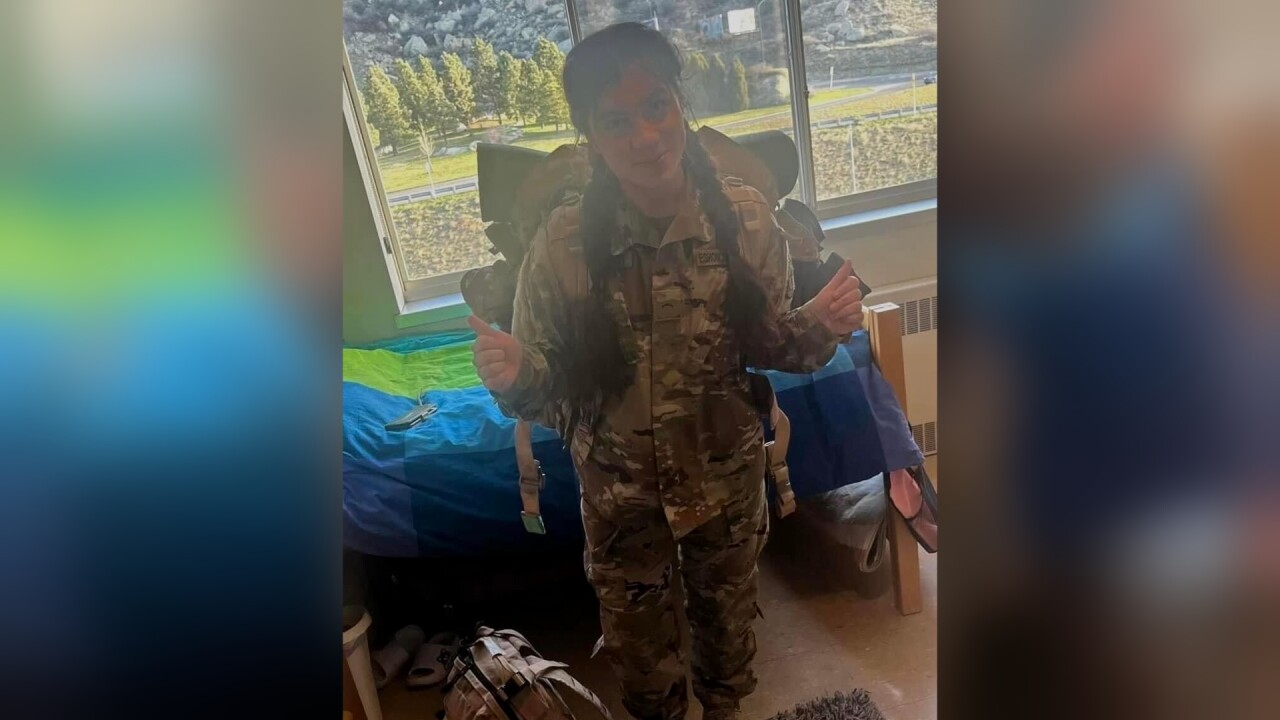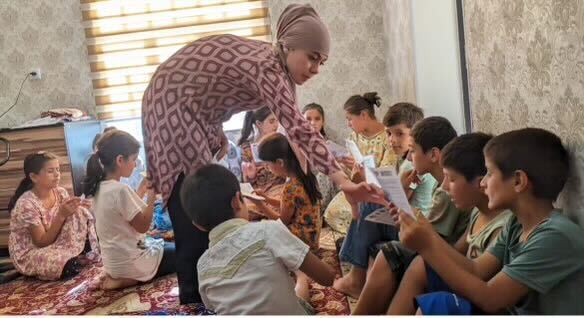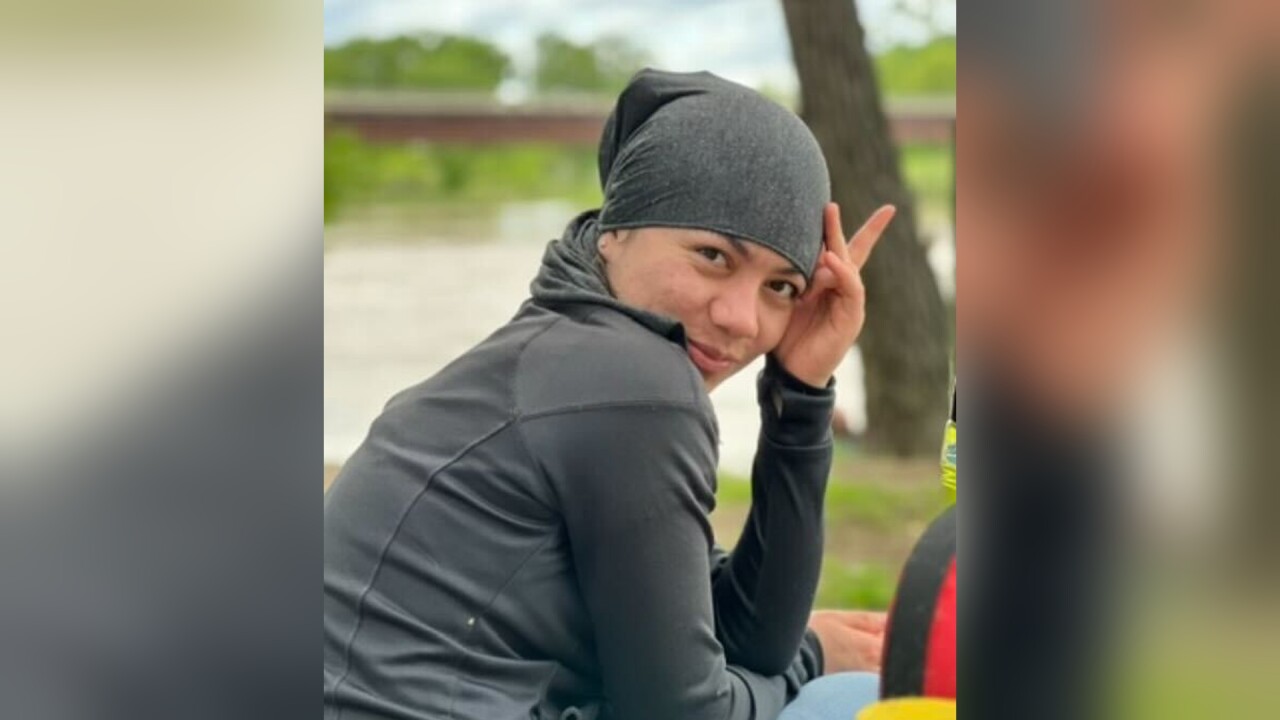BILLINGS — An international Montana State University Billings student is working on her education to keep her from an arranged marriage through the help of the Lambert community.
Parvina Eshonqulova is in her second year at the university and has kept a full schedule. She is working on her degree in Health and Human Performance with a minor in Business, taking 22 credits of coursework. She also works three jobs on the campus, including as an RA on her floor, and has involved herself in many clubs and activities.

The Parvina Education Project
Parvina enjoyed the ROTC program at MSUB.
Her education is not something the 19-year-old takes for granted as the journey to get to where she is now was not easy.
Parvina’s Background
She grew up in a village in Central Asia of 600 people with no electricity, running water, or plumbing (she declined to say which country). From a young age, she worked in cotton fields for money and learned how to sew. Culturally, women only go to school until their sophomore year of high school.
After that, they are usually expected to find a husband and stay home with chores. Because of this, Parvina was also expected to do this by her parents once she left school.
In her final year of school, the United States had set up access programs for students to apply for free that would help teach those who do not have regular access to other language programs. Students had to go through multiple rounds of applications and essays.
Parvina and several other of her classmates applied, and for them, it was a chance to travel to the next district and see the next town over. However, she did not think she was going to be accepted as too many had already applied for the school.
Nevertheless, to Parvina’s surprise, she was the only one from her village who was selected for the program. For the next two years, she studied there and was eager to learn.
“I had to walk like five miles from my village to the district because I want to have that education,” said Eshonqulova.

The Parvina Education Project
Parvina in her home country. She had to walk several miles to get to school.
However, her schooling was not approved by her father. He wanted her to get married but eventually accepted it because the program was free with lunch included.
Near the end of her schooling, Parvina found out about the Future Leaders Exchange Program, or FLEX, which is offered to students from the former Soviet Union bloc as a scholarship to study in the United States. Again, she was afraid to seek it out because of her father, but with the encouragement of a teacher, she applied.
“Only two of us passed and I came to the FLEX, and my dad was in Russia. That’s how I could get the FLEX and he was so mad,” said Eshonqulova.
With a desire for learning and a new scholarship, the program brought her to the States and the small town of Lambert, Montana.
Life in Lambert
Parvina arrived at Lambert as a senior in high school in the fall of 2022.
“She went from a rural place to another rural place, so she kind of chuckles about that,” said Stephanie Berg-Tossoun, Parvina’s host aunt. “She comes from a life that, yes, we have poverty in our country, but she definitely comes from a life that’s very different than what we can imagine.”
Stephanie Berg-Tossoun and her sister Necole Killick both work through the school district and as exchange coordinators through a program called ACES, American Cultural Exchange Services. Killick was sent Parvina’s profile and knew she would be a good fit for their community.
“What caught me was she talked about how her entire goal is to create schools in her rural area so the kids could finish school, and I thought, well, what a better place for her to come where we’re a small town,” said Killick.
She came to the U.S. on a language program with limited English skills and had to take an extra hour of English a week throughout the year.
“It’s amazing to see how much her English has grown throughout these last two years,” said Berg-Tossoun.
She stayed with a host family, and due to the small size of the school, she received plenty of help from teachers, especially Killick. At first, Parvina was worried she would not fit in with her peers, but those fears eventually disappeared.
“I was the weirdest person ever when I came to Lambert School, but thank God they accepted me like that,” said Eshonqulova.
Killick and Berg-Tossoun connected instantly with Parvina. It did not take long to view her as a part of their family. She was involved on campus, playing on the golf team that Killick coached, but despite making friends, she hid much of her background from them.
“Up until about March, she did not want anybody to know that she came from nothing. There’s no running water, there’s no electricity,” said Killick.
However, near the end of the year, something was wrong. It was one evening that she finally opened up to Killick about what she had been dealing with back in her home country.
“She finally broke down and she told me that when she went home, she couldn’t get a scholarship to go to university. Sshe would be married off by September,” said Killick.
For Killick, the news was heartbreaking, but for Parvina, it was something she had been holding onto for months.
“My dad called me like three months [before] and he said, ‘As soon as you’re getting here, your marriage is going to be like after a month,'” said Eshonqulova.
The girl they had gotten to know over the year would be sent back to her home country and married off in a matter of months. Unfortunately, it is the reality many women face, but Killick knew she could not let it be Parvina’s fate.
“It just hit me. It just really hit me when she was on that trampoline with my daughter giggling and having fun and I just thought, ‘she’s never been a kid, never in her whole life,’” said Killick.
Parvina was in full swing with her studies. She wanted to attend college with plans of one day starting a business and school for girls back in her hometown. In the semester she had been in Montana, she had a taste of freedom and experienced a world of cultural difference, one that allowed her to continue her studies and make her dreams obtainable. A forced marriage would completely shatter that chance.
Arranged Marriages
Arranged marriages are still common in many parts of the world.
According to the International Labor Organization, arranged marriages are viewed as a human rights violation. The numbers for forced marriages have risen from 15.4 million in 2016 to 22 million in 2021, and the rise is partially due to the COVID-19 pandemic, increases in poverty, decreases in education, and a surge in gender-based violence. Two-thirds of these marriages take place in Asia, estimated to be over 14 million people. Two in five forced to marry were children, 41% of those being under the age of 16.
The practice of arranged marriages is rooted in gendered norms. Women are often viewed as carers of the home and their roles as wives and mothers are where their value is placed. There are also many reasons why cultures still enforce arranged marriages, but they are primarily enforced by parents, nearly 73%.
Creating the Parvina Education Project
In the spring of 2023, Killick and the community quickly went to work trying to find a solution to help her escape from having to return. At a golf meet, her teammates were sad to learn about Parvina’s future but wanted to do something. On the drive home from the meet, the girls were brainstorming ideas and that night came up with the name the Parvina Education Project, a foundation to help not only Parvina escape an arranged marriage but for others as well.
They began raising money to pay for her college tuition, and the Lambert community stepped up to help.
“I had a family reach out to me and they donated a huge chunk of it because they just said, ‘I can never imagine having to force my daughters to be married,'” said Killick. “It was wonderful because that chunk, she just called and said, ‘How much more do you need for her to be here?’ And I told her and they just went and donated it and it was amazing to me.”
In the last seven weeks of school, Killick took over as her host mom. She became a part of their home, taking her in as one of the family’s own.
“I think of her as my daughter now,” said Killick.
They eventually raised enough money to send her to MSUB, but she had to first return to her home country to apply for a visa. Killick and Berg-Tossoun said the two months that she was gone for were terrifying.
“It just felt like it was like one obstacle after another, after another. She was calling me and saying, ‘I don’t think they’re going to give it to me,’ and I just had to say, ‘Just breathe, you’ll get it,’” said Killick.
“The day that she got her visa was so exciting. She called my sister immediately and let her know but it was also complicated because of where she lives with her family. She has to go into a city that’s a long ways away,” said Berg-Tossoun.
Parvina walked miles to apply for her visa but finally made it back to Billings to start her studies. However, her father still did not approve of her move. She hardly speaks to her mother since she is not allowed to use the phone and her father will only occasionally respond to her messages.
“I am the only girl, like first girl who actually escaped get out of that thing, and my society hates me right now and that is so hard,” said Eshonqulova.
Fundraising and Future Hopes
Due to her international status, she does not qualify for financial aid and most scholarships. She can only work jobs on campus, but her host family is worried that they will not be able to keep her in school for long.
“I worry every day that she may end up getting to have to go home because we can’t afford to keep her here,” said Killick. “We are trying to get it out there farther because a town of 300 can’t do it all.”
Parvina has goals for her future. In her first year at the university, she joined the ROTC program in hopes of one day joining the military, something girls are not allowed to do in her home country. She wants to work in healthcare to help women back home who do not have access to medical assistance.
It is an issue personal to her as her mother has breast cancer but she cannot get treatment for it as her father does not allow her to go into a hospital where there are men. She also has two sisters back in her home country that she wants to help bring over to assist them from an arranged marriage.

The Parvina Education Project
Parvina Eshonqulova
“She just has this wonderful spirit. She just connects really well with people, especially elderly people,” said Berg-Tossoun. “She just wants to be able to finish her degree.”
Killick hopes that the project can spread once Parvina can finish her schooling. She sees the passion that Parvina has to help others and believes that others in the same situation can be helped.
“She is probably the most determined person I have ever met in my life,” said Killick.
Overall, Parvina wanted to break a cycle that has kept many women like her from an education. She faced the daunting challenge of balancing her own aspirations with the uncertainty of her future. Yet, her determination not only brought her forward but also inspired a transformative project aimed at empowering other women trapped in similar situations.
Her journey highlights the significant power that resilience and compassion can have, showing that the pursuit of education and autonomy can spark a ripple effect of change, offering new possibilities for those who dare to dream.
“Girls can hear that or somebody under a forced marriage and they could have confidence that they can get escape of this and they can change their life,” said Eshonqulova.
The project is looking for donations to keep Parvina in school past this year. Donations can be sent to their PayPal or Venmo through the email parvinaeducationproject@gmail.com. There is also an account at Stockman Bank of Montana under the account The Parvina Education Project.
Source link : http://www.bing.com/news/apiclick.aspx?ref=FexRss&aid=&tid=66e4f3c503864c208ec6cb28d8bb2389&url=https%3A%2F%2Fwww.kpax.com%2Fnews%2Fmontana-news%2Fmontana-college-student-starts-program-to-escape-arranged-marriage&c=16682572311635133601&mkt=en-us
Author :
Publish date : 2024-09-13 14:34:00
Copyright for syndicated content belongs to the linked Source.
